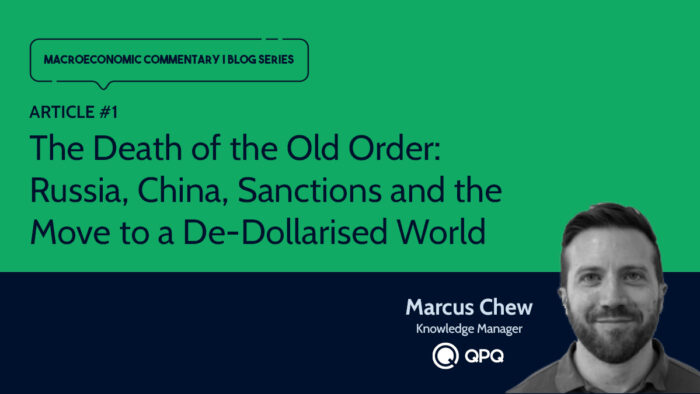
Typically, markets react strongly to geopolitical events and then bounce back, but Russia’s invasion of Ukraine could mark a seismic economic turning point, precipitating a shift to a bipolar global financial system – with the United States dollar on one side and the Chinese renminbi on the other. China have long been strategically arranging their chess pieces for such a shift, coveting a post-dollarised world where they would sit at the summit of a collection of vassal states, settling all their transactions in renminbi.
However, their currency’s share of global foreign exchange currently sits at just under 3%, compared to the dollar’s 59%. Incorporating a newly ostracised and isolated Russia into their new world order would help to reduce that imbalance, and provide China with an alliance bolstered by a shared and deeply held resentment of the United States for their perceived efforts to prevent both from maximizing their economic and military potential.
The Russian emblem, the double-headed eagle, like their foreign policy, looks both east and west, but historically, Russia and China have never been natural allies, despite their shared ideology. Doctrinal divergences led to a breaking of relations between the two countries in the 1950s in what became known as the ‘Sino-Soviet Split’, and it took over 30 years for even tentative ties to be re-established.
Since taking office, Russian President Vladimir Putin has worked hard to rectify that and forge new bonds, with some degree of success. As recently as this year’s Winter Olympics in Beijing, Chinese President Xi Jinping spoke in glowing terms about the burgeoning relationship between the two countries, describing it as having “no limits.” That was, of course, before the invasion of Ukraine which has turned Russia into a pariah on the international stage.
In the months since the war began, over 3,000 new sanctions have been imposed on the Russian Federation by the US and its allies. They have also been largely barred from using the international payment network SWIFT, while the world’s largest credit cards, Visa and Mastercard, Apple Pay and Google Pay, and internet payments giant PayPal have suspended services within the country.
These sanctions threaten to put Russia at risk of their first default since 1998, even if it would only be an “artificial” one, as the Kremlin vociferously, and correctly, insist. Indeed, before it invaded Ukraine, Russia’s low debt and vast oil and gas exports made it one of the most creditworthy countries in the world, but Putin’s reckless impulsiveness has undone in months what took decades to build. They are now a country cut off from the world’s financial system, on the verge of default despite having both the wiliness and resources to pay.
Even still, the Russian economy clings desperately to life. Just three months after the rouble fell to under the value of a US penny, the currency has remarkedly jumped 45% against the dollar, with one dollar now worth 53.45 roubles as of the end of June. This is due in part to the dramatic rise in commodity prices (with many foreign buyers of Russian energy exports also agreeing to pay in roubles), and aggressive measures to prevent money from leaving the country, such as the strict capital controls imposed by the highly respected head of the Russian Central Bank, Elvira Nabiullina.
Nabiullina appeared poised to leave her post soon after the invasion of Ukraine began, with her reportedly informing Putin that the move would plunge the economy into a ‘sewer’ while handing in her resignation. However, the Russian President blocked her from leaving in a move that has proven to be a masterstroke.
While Nabiullina’s wartime efforts to steady the economy have so far been highly successful, many analysts believe the effect is only short-term. Russian industry has been decimated, there is a steady “brain-drain” of talent out of the country, and they have been forced to sell their oil and gas at discounted rates to atypical foreign buyers, such as India, while Europe is taking measures to cut their now highly contentious gas imports from the Federation by 2/3 this year.
So, the fact is that, while Putin’s reckless actions in Ukraine are glaringly at odds with Xi and China’s approach of meticulous patience, he and his country cannot survive much longer alone. They need to win China’s favour and support now, more than ever.
In the three articles that will, over the next few weeks, follow this introduction, we will take a deeper look at the current relationship between Russia and China, investigate the means at Xi’s disposal to help his dysfunctional ally navigate the crisis and evade sanctions, and finish with a dive into how all this might play into creating a de-dollarised world with China at the summit.
